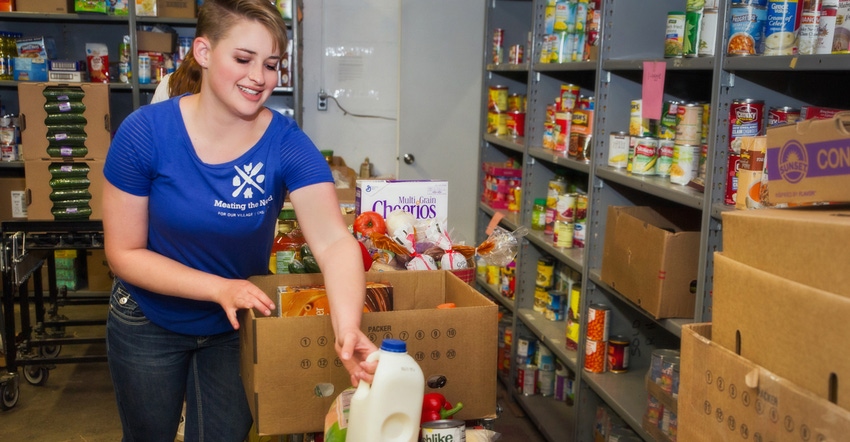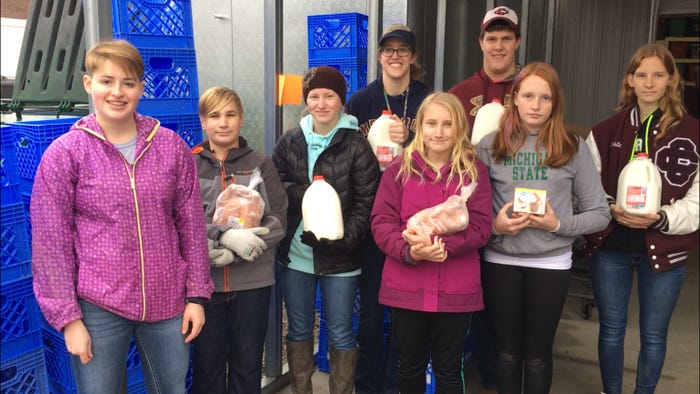
Addy Stuever Battel believes in investing in people, particularly when it comes to food security. Although she’s no longer leading the charge with a community project she founded at age 12, the effort continues as “Meating the Need for Our Village” rallies community members to supply much-needed, nutrient-dense foods to those in need.
Now, six years later, Meating the Need for Our Village is a nationally recognized, hunger relief nonprofit with a $63,000-plus impact on the community. More than 500 youth have joined Battel in raising meat and eggs and procuring dairy products and produce for low-income families in three counties, distributed through seven food pantries.
Her efforts and the impact of Meating the Need for Our Village recently garnered the 2021 National FFA Service Learning Proficiency award. This adds to her 2019 4-H National Youth in Action Pillar award for agriculture.
Meating the Need for Our Village began when her hometown of Cass City, Mich., lost its only grocery store — becoming a food desert — leaving dollar stores and food pantries as the only places to access food.
As Battel was volunteering at her local food pantry, “I recognized the need for protein,” she says. So, with some help, she wrote her first $2,500 grant proposal to buy and process 50 broiler chickens and recruited other junior FFA members to help.

GROUP EFFORT: More than 500 youth have joined Battel (left) in raising meat and eggs and procuring dairy products and produce for low-income families in three counties, distributed through seven food pantries.
It grew to her managing a network of youth raising meat animals, and managing the ordering and distribution of meat, cheese, milk and produce. Battel also manages adult volunteers, consults with food pantries on their needs, chairs organizational meetings, conducts media relations as the group spokesperson and trains others in food security.
“I have become a hunger advocate,” she says. “I have spoken to audiences from Seattle to Washington, D.C., about hunger and youth empowerment, reaching nearly 3,000 youth and 1,000 adults, some of whom have been inspired to begin their own hunger relief work.”
Battel has seen firsthand the effects of hunger. Her adopted brothers, Asher, 12, and Elias, 10, both come from biological families affected by poverty and malnutrition. Elias was removed from his mother at birth and suffered from fetal alcohol syndrome. He was placed with the Battels when he was 19 days old. Asher, who is nonverbal, came to the family at 3 years old. Both have autism.
“There are lifelong effects from malnutrition,” Battel says. “It was a huge reason for my work.”
Battel, now in college, is stepping back some from the project, but not before she made sure it would go on without her. “Two years ago, I was getting really nervous about the future of the project,” she says. “I knew that I'd be moving away to college very soon.”
With her mom, peers, and 4-H and FFA advisors, they wrote a set of bylaws for the group, with input from the community identifying needs going forward. She’s on the board of directors, no longer the leader, but her family is still very connected as her younger sister, Dori, 15, is involved.
7 questions for Addy Stuever Battel
1. What made you want to do this project? “As one of four charter members of Cass City’s junior high FFA chapter, I saw this as a way to enjoy my time as an FFA member, and to do something really fun and impactful with my friends. I also enjoy raising animals, particularly poultry. This was a way to sell a bunch at a time, some to my customers, and the rest to benefit the food pantries. But, truthfully, as soon as I started the project, I did genuinely develop a passion for the impact of the project. I was amazed at the amount of high-quality protein we could put into the community that otherwise wouldn't have been there.”
2. What did you get out of it? “It has definitely been one of the biggest influences on what I'm doing in my life now. It showed me, from a really young age, that I can do things that are important for my community and for the world. I have developed a passion for the impact agriculture can have on the world and the value of bringing people together around shared values and shared skills. It has also sparked my interest in communication a lot, particularly in writing, which was developed a lot through the grant writing I did for Meating the Need for Our Village. I have been employed a couple places as a journalist, and I really enjoy that.”
3. How has 4-H and FFA influenced your life? “Oh my goodness. … Do you have like three days? I was surrounded with adults who really empowered me to do the things I was passionate about, supporting me, but also to just get the heck out of the way when I was ready to go for something. Those relationships, as well as wonderful peers surrounding me. The relationships with young people who share the same values, and similar and complementary skill sets, have developed into lifelong friendships.”
4. Who are your mentors and why? “I have several, but first and foremost, absolutely my mother, Sue. Obviously, she raised me, but also has the most influence in helping me develop the things I'm interested in and the skills I have, whether that's through nature or nurture or both. We share a common idea that everything can always be made better. We are problem-solvers. My aunts and uncles are supportive, but I also have some very wonderful mentors who are not related, including every one of my county and state 4-H leaders. I'll also add my FFA advisor both at the chapter [Leigh Osentoski and Heather Middleton] and state level. Mr. Wyrick and Mr. Forbush were very active in mentoring me while I was a state officer. I was becoming an adult, and they recognized that transition in my life and were influential in offering the kinds of support I needed during that time.”
5. What did you want to be when you were 8 years old? “I wanted to be an astronaut farmer. I wanted to have animals on Mars. I'm not sure where I got that idea, but that's what I wanted to do.”
6. What are you doing now, and what are your plans for the future? “I am currently at Michigan State University earning my [bachelor’s] in environmental studies and sustainability with a minor in environmental sustainability studies. I'm also pursuing a minor in integrated learning. I have a lot of thinking to do, but I'm probably going to pursue a master's program in communications after this. While I value environmental science and agriculture science and science in general, I think the way I want to use those skills is through communication. I'll hopefully be doing an internship in D.C. in policymaking this summer. This form of communication can make real change in the world.”
7. What advice do you have for other young people wanting to make a difference? “I hope every young person understands they really can make a difference. And they can do it right now. I think adults have spent so much time asking us what we want to do with our lives in the future and not enough time asking young people what they're excited to do and capable of doing right now.”
About the Author(s)
You May Also Like






